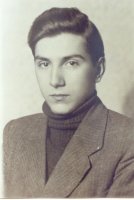
Jerzy Lisiecki,
born on August 22, 1923 in Warsaw
leading rifleman, The Home Army (AK) soldier a.k.a. "2422", "Jerzy II"
Battalion "Ruczaj", Company "Tadeusz Czarny", Platoon "Orlik"
Battalion "Harnaś", Company "Genowefa", Platoon 138
The Witnesses' Uprising Reports
Memoirs of Jerzy Lisiecki a.k.a. "2422", "Jerzy II", the soldier of two Uprising Battalions: "Ruczaj" and "Harnaś"
War and occupation
On August 31 in the evening I reached Radość. There on September 1 in the morning together with my grandma I got into an electric train to Warsaw. I remember a long line of people waiting at the railway station to make a telephone call from the payphones installed there. We did not comment that, I just bought the tickets. The queue was nothing of interest for me. We had a telephone in the Wiejska flat, I still remember the number: 724-34.
We got onto the train. There was completely silence in the compartment, nobody would talk, although there was a crowd of travelers. We reached the Gdański Railway Station. Having got off, we heard an alarm. I told my grandma there was probably some trial alarm. I didn't know the war had broken out. After few minutes the alarm was called off. Then, having left the station, we heard the second alarm. Some shooting was also heard. People said that the war had begun and there were anti-aircraft guns and bullets heard everywhere.
We got to the Aleje Jerozolimskie. There I let my grandma get into a tram and go to Sadyba. There was another alarm and more and more shooting. In the sky I saw airplanes and heard bombing. I hid myself in some gateway and I understood - it was war indeed. I thought - Just you wait Krauts. I must admit I used to treat that as an adventure then. I had not expected that would end up so tragically.
Then I reached the Wiejska street on foot, as it was not such a long distance from the Aleje. At home we had a radio, thanks to which we could hear officially of the war. And so it began. On September 4 France and the Great Britain declared the war against Germany. Everybody was very enthusiastic on the news. I remember two big demonstrations by the embassies. I don't remember if I participated in both of them; maybe in the one by the French embassy because it was nearby.
September 8 came with sad news: some cities like Łódź and Sochaczew had collapsed. The world was falling. Pure tragedy. On September 9 the Germans approached Warsaw. The capital's siege began.
There were constant air-raids. Till now I remember the sight of a burning Parliament building's dome and how huge flames there were. We were sitting in a cellar shelter. I remember one soldier from the region of Wielkopolska or Silesia who accompanied us. Suddenly
a big noise. It was caused by one of smokers in which smoke-black would gather. This smoker opened with a big noise. The soldier was sitting nearby so he became black at once, he cursed. I was about 3-4 meters away. I don't know what happened with him later on. I also remember people cutting a killed horse, at the corner of Górnośląska and Wiejska streets.
As scouts, we had masks. Owning a gas mask was believed to be lucky. There were also some pads but we looked down on them. My brother got a gas mask and his value increased. During the siege neither me, nor my brother used to troll in the city but we stayed near our flat.
On September 17 we were stabbed in the back by the comrades from the East. It was a real tragedy. And then the Germans stepped in. Their reconnaissance planes with crosses were Flying around and photographing nobody knew what. Some dozen of them were flying, dozens of times. At last the German troops moved in - it was a disaster.
I remember that Germans put some pots in the Aleje Ujazdowskie and gave some soup and black bread there. Unfortunately, queues of Polish people grabbed for these. Unlike us. Then there was a German official march, but no Polish citizen was allowed to watch it. All side streets were blocked. The fact that the Germans were doing so good was truly shocking for us. We had not expected that.
And so the occupation began. In these new circumstances my father tried to provide for his family. He was quite a resourceful man. He bought a cart with a horse. One elderly cavalry captain was carter. My father had friends who worked as civil servants in the American embassy in Aleje Ujazdowskie. His sister-in-law, Marian's wife, was an American citizen. The ambassador was absent at the time.
So my father managed to get a certificate of him bringing provision for the embassy. We went to a sugar plant several times. Then we went to Karczew to bring meat. Father bought an English car Ford 10 that used to be a taxi-car. It was usable till the time when petrol restrictions were introduced.
Afterwards, my father - due to his education and experience - opened a workshop to repair electromechanical and X-ray machines. It was situated in the Nowy Świat 27 street. My father was fluent in the German language as he studied in Berlin for a few years before the WW I. Sometimes it was a very useful command. The workshop survived the whole occupation. It was destroyed by the bombardment during the Uprising.
Later my father bought the whole carriage of partly burnt screws. Our relatives and friends would cleanse and sort them out. Special equipment filled with sawdust and sand was used. Few weeks passed by and my father became a Warsaw king of screws. Then he set up a shop at the corner of Zielna and Świętokrzyska, this building is non-existing now. The business had been very successful till the very Uprising. The workshop in the Nowy Świat was only a camouflage. The rent pay was very little. Some relatives of us who had come from the Poznań region, stayed in this workshop.
In the year 1942 Germans started to organize a German district. The Wiejska street found itself inside the area. Krauts would come to our flat and look around. They did like it. In such a situation my father started to look for a new place. His perfect command of German came in handy again. He transacted a very nice flat in the Królewska 27 street. It was a spacious flat, as well: five beautiful rooms.
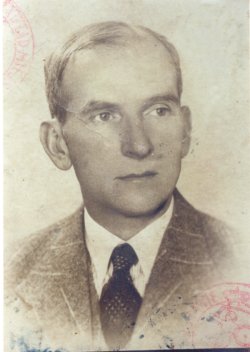
my father Piotr Lisiecki in the year 1942
We did not stay in the whole flat. Two rooms were occupied by Germans. Thanks to that we had no problem with electricity. During the occupation in Warsaw, due to energy restrictions, lights used to be turned off, every second day at the even and uneven sides of the street. Our house, thanks to the Germans settling there, had electricity ceaselessly.
In Warsaw, apart from my father, two his brothers lived, too. These were: the oldest Stefan, a mechanical engineer, and Marian, younger than my father, the one married to an American woman. The youngest Wacław, a military aviator, had been unheard of throughout the whole occupation. It was only known that at the mobilization he was led to Poznań.
In the year 1946 or 1947 a civil servant of the British embassy came to us with the information about him. It turned out that my uncle captain Wacław Lisiecki evacuated himself in the year 1939 from Poznań to Wołyń. There he escaped from the Soviet train heading with Polish officers for Katyń. The local habitants would hide him and taken from one village to another. Later he led to Romania, next to Greece and from that country a British submarine took him to Malta. From Malta he got to France and fought in air battles over France. In the end he landed in England, where he fought in the 304 Bombing Squadron of RAF (Royal Air Force) as a navigator.
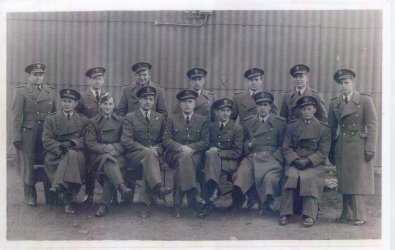 |
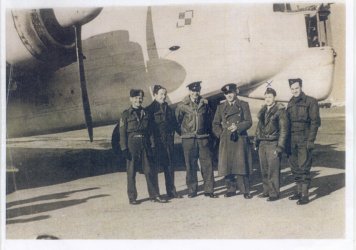 |
my uncje Wacław Lisiecki as a RAF officer, England
For his fighting merits he was awarded with the Cross of Valour (four Times), with the British Air Medal (four times), the Atlantic Star medal and other British and French distinctions. After the war he did not come back to Poland. He settled in the United States of America.
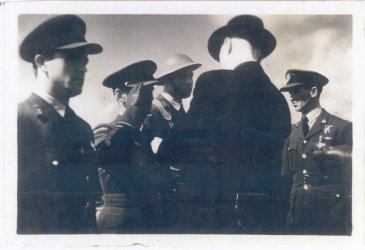
the moment of honouring Captain Wacław Lisiecki
After a short break clandestine tutorship was continued at schools. Firstly, secondary schools were functioning normally, then Germans started to close them down. It was not desirable by Germans that the Polish people were too educated. Having faced that, the Polish people started clandestine education.
I had one year of break in my education, 1939-1940, probably. I was such a wispy child that mum called me Pajączek (a little spider). My brother, who was almost two years younger than me, was taller and better-built. My mother's friend, the one from the Crimea, was a manager of a tuberculosis sanatorium in Świder. She was befriended with Mrs. Zapaśnik MD, the medicine professor after the war. The former woman said, "Jerzy is so wispy. I will go him to the sanatorium with me." So I stayed in Świder for almost a year.
Together with my brother I had a contact with the Górski secondary school. It was placed in a big building in the Górski street. Its part had been taken by Germans. The school was opened at first, then closed by Germans, to be reopened afterwards. First degree and second degree courses for vocational schools were carried there.
Simultaneously it was necessary to attend the clandestine classes because in those official lessons there was no History, no Religion education, no Polish language. I graduated from the second degree vocational school. It was ended with an examination, similar to a Matura exam, but it couldn't be called Matura as it included no History, no Polish language, no Latin. The German language was obligatory, though. Their aim was to make us some craftsmen, or so.
At the same time I was attending the sales school. It was an equivalent for a second degree school, a sales-aimed vocational school. Prof. Piętka was a lecturer there. He was a very honourable man, the SGGW lecturer. I was not a SGGW graduale, it was just a camouflage. I had papers from the school that could save me from taking to Germany, in the case of a control. Apart from that, I was believed to work at my father's. To prove this, I had a proper Arbeitskart.
A year later, Germans closed down this sales school. All the students got the information to come forward as volunteers to the works in Germany. Supposedly nobody came. Like my few friends, I got the call to the Skaryszewska street, the place of a temporary camp, from where people were taken to the works to Germany. I think it was the year 1943.
My father knew some radiologists. He was aware that before one's leaving one had to be examined by a qualifying medical board. I was made suffering from tuberculosis. I got an official notice and Germans left me. I was no exception as far as the preventive measures of this kind were concerned. My friends who went talked about some doctor who had been very surprised by the fact that all the volunteers were seriously ill. Most of the students did not come at all. Germans did not impose any sanctions for that.
As I mentioned above, I would not systematically go to the sales school. To the clandestine classes, conversely and like everyone, I attended regularly and was an eager student. It was said to be our patriotic duty. The result was my having passed the Matura exam in June 1944. My brother also attended the Górski school, to the one-level lower grade.
In the year 1941 my brother and I began our commitment in conspiracy. Its beginning was connected with the Cadet environment. My brother's friend, Tadzio Trębacki, was a Cadet in the Cadet Corps in Lvov. After the war outbreak he left to Warsaw and came to the same class at the Górski School as my brother did. It was he that offered my brother to join the organization. I decided to accompany them. The group we had joined, constituted the Home Army Group "Ruczaj".
We would meet on Fridays. During trainings we were reading "Squad commander's manual" and "Platoon commander's manual". My brother managed to get the original books. We were both delving into the content of them. I was 18 at that time.
We would go to practice "actions" to the forests in Józefów or Dębe Wielkie. Nearby Michalin we would practice by the wreckage of an English tank called "Matylda" that had been used by Germans and was damaged in the year 1939. I remember assemblies, grill and entrenching, attacks and retreats. The training was not finished with an examination, though. The practice lasted until the year 1943.
One day in the year 1943 our friend, Janusz Chyliński, came by and said, "The one who has 700 Polish zloty, will get a Parabellum (a German semiautomatic pistol)." Together with my brother I used to trade in books then. First, we would buy coursebooks for clandestine classes in order to sell them the people who needed them, too. There was a small market in the Szkolna street, the place of making deals. Coursebooks were demanded then as they could not be printed during the occupation. Often one could earn a lot. Once, I remember, I bought a Latin coursebook for class 1 and paid 10 Polish złoty to sell it for 100 Polish złoty. It was a rarity then as such books were not officially on market. My brother was better in the book trade. He used to have more cash than I did. That i show he became an owner of a great parabellum pistol that included two almost full clips.
I remember the day when our section commander, Leszek Filipkowski, my classmate, told us at the assembly, "Guys, I've brought a nice buddy with me". And indeed, it was a friendly tall blond man. Now there were six of us, instead of five. Our assemblies were being continued, Turing which we were practising setting and resetting the pistol owned by my brother Konrad. The new boy made a good impression. He would join us at the assemblies in the Królewska street and in the Zielna street, at Leszek's.
Two or three moths later Leszek Filipkowski popped into our meeting with a pale face and Said, "Listen guys, it's not good. I've seen this new buddy (I don't remember his name) walking in the street with somebody wearing a Hitlerjugend uniform. They were talking vigorously and laughing."
We were all puzzled and had no idea what to do. At some point my brother even suggested to shoot him by means of our Parabellum, but we rejected this idea. We were sure our flats were not safe anymore. It was necessary to move out immediately and all five of us did so. Everyone to a separate place. Leszek went somewhere in Pustelnik, I and my brother moved to our uncle in Mokotów.
We stayed there for a month. It was peaceful. Nobody ever came to our parents to look for us, so we came back home. But we lost the contact with our organization and for the next 2-3 months we could not be active. Leszek told us that he had no contact with the command, our assemblies were cancelled and our squad was going to be disbanded. In such circumstances our future "Ruczaj" was dissolved. Fortunately, we lost contact with that boy from the Hitlerjugend organization.
Two or three months passed by and father gave us some contact to his friend, prewar cavalry captain Stefan Marin, whom father had known from Odessa. Thanks to him in spring 1943 my brother and I joined the National Military Organization "Stolica", the armed underground organization of the National Party.
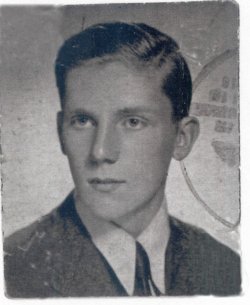
my brother Konrad Lisiecki in the year 1943
Again we began trainings, this time military and political ones simultaneously. We had to study the works of Roman Dmowski. We did not fully approved of this kind of politics , although we considered Roman Dmowski a very decent man. Together with Ignacy Jan Paderewski he had signed the treaty of Versailles. We also had to know the National Party statute as well as read Dmowski's "I am Polish." We were then examined.
We also passed a military training examination. In May or June 1944 I became a leading rifleman. Having taken an oath (I don't remember an exact date) I got a nickname "2422". There was such a nicknames' system. Our commander in the Warsaw District was Tadeusz Maciński, a National Party activist. We all liked him very much.
At the Mercantile School I was befriended by Stasio Achajski. His brother-in-law would trade in weapons. We wanted to have some, so we bought from him a pretty good carbine rifle. Its only disadvantage was that it did not have any bullets. Besides, we decided it was too big for us. My brother had some contacts in nearby-Warsaw-locations where he used to provide underground press. We put the rifle to a fishing rod cover and, simulating the fishing expedition, we left to the place called Rzezeń. There we were lucky to sell the rifle and gain some money. It was neither clever nor safe but we were both young and foolhardiness was our second name then.
Afterwards we owned two handguns 6,35 calibre, small lady's pistols. We would soak them in petroleum in our bath. Then we sold them because they were too small. We also gained a handgun 7,63 calibre, to which my brother got about 20 bullets, a bit rusted on the surface. I decided to take this one for myself. And I decided to try the purchase.
It was the beginning of July 1944. Together with Leszek Filipkowski I went to Żoliborz to try shooting the gun. Leszek belonged to "Ruczaj", I belonged to the National Military Organisation, and this was no obstacle. Together we would go to the clandestine lessons to the Górksi's. Our friend Jurek Chyliński lived in Żoliborz. In this district tere live also the twin sisters, my and Konrad's sweethearts.
So we went to the Vistula beach. There were bushes nearby the beach and we thought it was a good place to make this shooting test. It was a sunny day and there were losts of people around. In such circumstances we couldn't just shoot. We came back to Żoliborz and visited our friends. We overstayed the visit a bit and had to come back home by tram in the late evening. The tram had a route via the Bonifraterska, Krakowskie Przedmieście and Nowy Świat. We didn't have watches but there was nobody to be seen in the streets.
There was a tram stop at the corner of Krakowskie Przedmieście and the Królewska street. We got off and moved into the Królewska street. My flat was in the Królewska 27, next to the present "Victoria" hotel. Leszek lived a bit further, in the Zielna street. Nearby there was the Kronenberg's palace, damaged in the year 1939, the whole burnt, uninhabited.
We almost got to the middle of the Piłsudski square when suddenly the German patrol appeared ahead of us: a Feldgendarmerie gendarme, a Schupo policeman and a Polish Navy-Blue policeman. It was perfectly silent. One could hear only sounds of hobnail shoes. Leszek worn shoes hobnailed with car steel, whereas I worn German shoes with nails. From the opposite we could hear the shoes of these Germans. Bumping must have been heard at the whole Piłsudski square.
I had the handgun, not having tested yet. Very silently I said to my friend, "Leszek, if needed, I'm rushing to the left, and you to the right, I'm taking out my gun and shooting". The patrol came close enough I could look them in the eyes, so did Leszek. He had a night pass, I had All student documents and my Kennkarte. I also said to Leszek, "Watch out, they are said to have such a habit of attacking from the back once you pass them."
We passed each other. Leszek and I stepped about 10-15 meters awaiting the scream: "Halt, hände hoch!" ("Stop, surrender!") Nothing. Just silence. I was not more than 100 meters away from Home. We were walking further on, our with the feeling of rising anxiety. We both luckily reached our homes.
Leszek was a bit more lucky than I was. He worked in a private workshop which dealt with fixing the Wehrmacht cars that had been on the front. Thanks to that he had a twenty-four-hour pass. In some cars that were being fixed there was dried blood. Leszek once found about 20 bullets hidden under the floor, and gave me them as a gift. Unfortunately, there were no bullets to my gun there.
A week later, about July 20, we went again with the same plan as before, but this time my brother accompanied us. Stasiek Kowalewski from the "Koszta" Company lived in Józefów. He told us, "Guys, come to me, you can stay for the night, we can swim in Świder and try this handgun of yours". My brother took his Parabellum which he wanted to test, as well. Józefów was situated nearby Warsaw, on the Otwock route.
So we went several hundred meters on Świder. The weather was beautiful but there was nobody there. One could feel the Soviets were closer and closer. We crossed the bridge. On the other side there stood a small house on which it was written "Lody" ("Ice cream"). My brother aimed and hit a letter "O". I took my gun, aimed, pulled the trigger. Silence. I repeated everything. Silence again. And again nothing. My gun did not shoot. Neither of 20 bullets was effective.
Till now I keep wondering what would have happened if the patrol in the Królewska street had screamed at us, "Halt! Hände hoch!". Their two submachine guns and a Vis against my handgun with broken bullets. In a quarter they would have been in my flat. They would have killed all of us. In the hallway next to the entrance door (we would get into the Flat from the kitchen; there was a two-yard-tenement house), my two or three handguns were soaking in petroleum. Contrary to all the conspiration rules I had with me all my student documents and my Kennkarte. It was extreme foolishness. I broke these rulet but surely God's Mercy must have watched over me. I believe in God with all my heart.
Twenty-year-olds tend to be remorseless. I did not give in. On July 24 or 25 we went to Józefów again. Trains were not going then. We saw the tracks damaged. Some hellish machine must have done that. It was clear that the Germans were preparing themselves to the retreat.
The bridge was not damaged, though. We crossed it and repeated our shooting operation. My brother had bullets that Leszek had given him, I also got several to my handgun. This time my gun came up trumps. My brother even hit a letter "O" from the distance of a dozen or so meters. The bullets were just fine.
We came back home from Józefów on a locomotive rooftop. There was a crowd of people. We got off in the Skaryszewska street and moped to the Waszyngton square. There were crowds of escapees in the streets. We saw carts, cows and Cossacks. Russians, Ukrainians, some of them were armed, the big cavalcade of people. All of them were rushing towards the Poniatowski bridge. It was panic and inertia around. In July the front was closer and closer. The Soviets had crossed the borders of the pre-war Poland, in the Volyn, I suppose in Sarny. About two weeks before the Uprising they had occupied Mińsk Mazowiecki.
Our friends belonged to different underground groups. We socially contacted guys from "Koszta", "Zośka", "Baszta" and "Parasol". I remember one day Staś Rybka, who belonged to "Zośka" dropped in and left his Vis pistol. He said that a moment before in the Starynkiewicz square, next to the Aleje Jerozolimskie car barn, the Krauts had been executed. He was slightly wounded and we dressed his wounds.
We made friends with two boys named Borowicz, who told us they were being trained in the engine platoon. Later they turned out to be in the "Giewont" company, the "Zośka" battalion. They both fell in the Uprising. They came from Białystok, and live in the Królewska 27, like we did. It was where we got to know each other. We would also exchange underground news-sheets. My brother was a distributor of a National Military Organisation magazine "Walka" ("Fight") and other writings of the National Party. He would distribute them, each in several dozens, in locations nearby Warsaw. We received "Biuletyn Informacyjny" ("Information Bulletin") from female friends.
We also had an amplifier to play gramophone records. Our friend was a bit acquainted with radio engineering and he adapted that amplifier. Thanks to that, while turning the rotating condenser, from time to time I could hear specific bumping sounds of the London radio. Our friend boasted about listening to London regularly.
About August 27 the Germans informed by means of posters and megaphone announcements that a hundred thousand men are to occur with shovels to dig ditches. As far as I know, Nobody occurred. 3-4 days before the Uprising out break the alarm had been announced, it was the state of emergency. We were called in to the Kopernika street. Several dozens of boys stayed there. After 3-4 hours we were let homewards but we were told not to wander off too far away, to report ourselves every several hours and to wait for the call for action. Such a situation lasted till the Uprising outbreak.
Jerzy Lisiecki
edited by: Maciej Janaszek-Seydlitz
translated by: Monika Ałasa
Copyright © 2016 Maciej Janaszek-Seydlitz. All rights reserved.